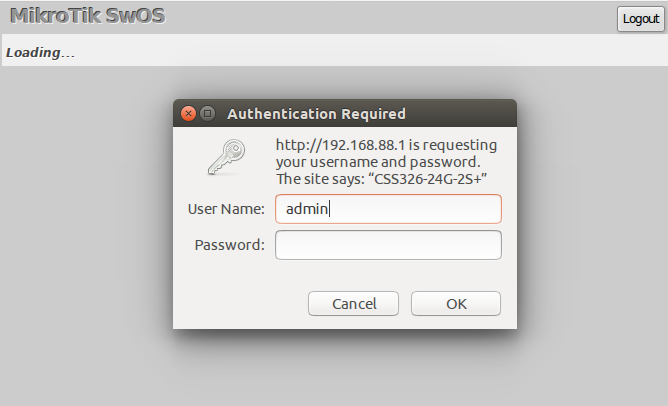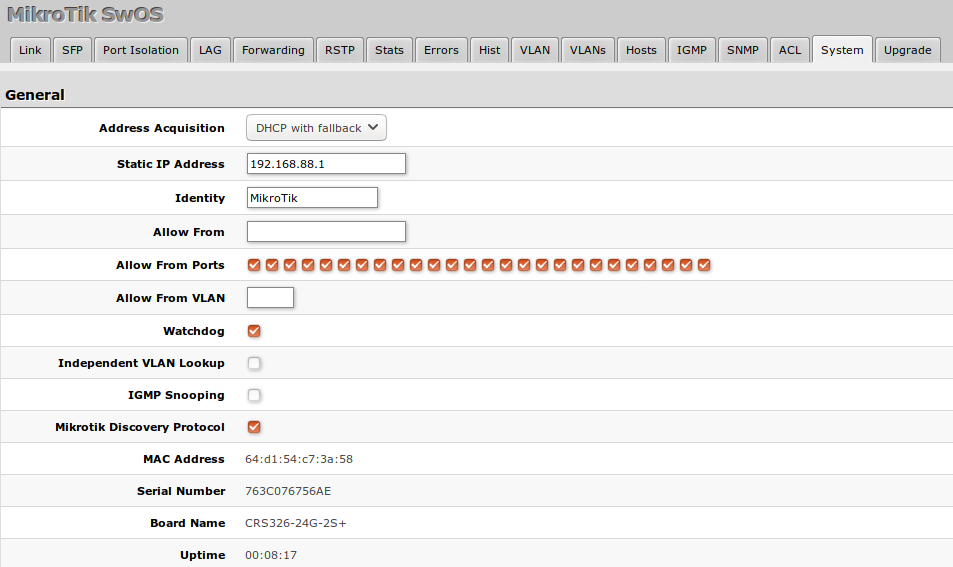SwOS/CSS326: Difference between revisions
mNo edit summary |
mNo edit summary |
||
| Line 1: | Line 1: | ||
==Summary== | ==Summary== | ||
<p> | <p> | ||
SwOS is an operating system designed specifically for administration of MikroTik | SwOS is an operating system designed specifically for administration of MikroTik switch products. | ||
</p> | </p> | ||
<p> | <p> | ||
| Line 17: | Line 17: | ||
</p> | </p> | ||
{{ Note | MikroTik | {{ Note | MikroTik Neighbor Discovery protocol tools can be used to discover IP address of Mikrotik switch. [[Manual:IP/Neighbor_discovery]] }} | ||
==Interface Overview== | ==Interface Overview== | ||
| Line 52: | Line 52: | ||
* Configuration reset | * Configuration reset | ||
* Backup and restore configuration</p> | * Backup and restore configuration</p> | ||
{{ Note | SwOS uses a simple algorithm to ensure TCP/IP communication - it just replies to the same IP and MAC address packet came from. This way there is no need for Default Gateway on the device itself.}} | {{ Note | SwOS uses a simple algorithm to ensure TCP/IP communication - it just replies to the same IP and MAC address packet came from. This way there is no need for Default Gateway on the device itself.}} | ||
[[File:swos_system_css326.png|alt=Alt text|CSS326-24G-2S+ General Settings|center|frame]] | |||
<br/> | |||
<table class="styled_table" > | <table class="styled_table" > | ||
<tr> | <tr> | ||
| Line 63: | Line 63: | ||
</tr> | </tr> | ||
<tr> | <tr> | ||
<td><b>IP Address</b></td><td>IP address of the | <td><b>IP Address</b></td><td>IP address of the switch</td> | ||
</tr> | |||
<tr> | |||
<td><b>Identity</b></td><td>Name of the switch (for Mikrotik Neighbor Discovery protocol)</td> | |||
</tr> | </tr> | ||
<tr> | <tr> | ||
<td><b> | <td><b>Allow From</b></td><td>IP address from which the switch is accessible. Default value is '0.0.0.0/0' - any address</td> | ||
</tr> | </tr> | ||
<tr> | <tr> | ||
<td><b>Allow From</b></td><td> | <td><b>Allow From Ports</b></td><td>List of switch ports from which it is accessible</td> | ||
</td> | |||
</tr> | </tr> | ||
<tr> | <tr> | ||
<td><b>Allow From | <td><b>Allow From VLAN</b></td><td>VLAN ID from which the switch is accessible (VLAN Mode on ingress port must be other than <code>'''disabled'''</code> in order to connect)</td> | ||
</td> | |||
</tr> | </tr> | ||
<tr> | <tr> | ||
<td><b> | <td><b>Watchdog</b></td><td>Enable or disable system Watchdog. It will reset CPU of the switch in case of fault condition</td> | ||
</td> | |||
</tr> | </tr> | ||
<tr> | <tr> | ||
<td><b>Independent VLAN Lookup</b></td><td>Enable or disable | <td><b>Independent VLAN Lookup</b></td><td>Enable or disable independent VLAN lookup in the Host table for packet forwarding</td> | ||
</tr> | </tr> | ||
<tr> | <tr> | ||
<td><b> | <td><b>Mikrotik Discovery Protocol</b></td><td>Enable or disable Mikrotik Neighbor Discovery protocol</td> | ||
</tr> | </tr> | ||
<tr> | <tr> | ||
<td><b> | <td><b>MAC Address</b></td><td>MAC address of the switch (Read-only)</td> | ||
</tr> | </tr> | ||
<tr> | <tr> | ||
<td><b> | <td><b>Serial Number</b></td><td>Serial number of the switch (Read-only)</td> | ||
</tr> | </tr> | ||
<tr> | <tr> | ||
<td><b> | <td><b>Board Name</b></td><td>MikroTik model name of the switch (Read-only)</td> | ||
</tr> | </tr> | ||
<tr> | <tr> | ||
<td><b>Uptime</b></td><td>Current | <td><b>Uptime</b></td><td>Current switch uptime (Read-only)</td> | ||
</tr> | </tr> | ||
</table> | </table> | ||
===Health and Global RSTP=== | ===Health and Global RSTP=== | ||
<br /> | <br/> | ||
[[File: | [[File:swos_system2_css326.png|alt=Alt text|CSS326-24G-2S+ Health and Global RSTP Settings|center|frame]] | ||
<br/> | |||
<table class="styled_table" > | <table class="styled_table" > | ||
| Line 124: | Line 121: | ||
<tr> | <tr> | ||
<tr> | <tr> | ||
<td><b>Bridge Priority (hex)</b></td><td> | <td><b>Bridge Priority (hex)</b></td><td>RSTP bridge priority for Root Bridge selection</td> | ||
</tr> | </tr> | ||
<tr> | <tr> | ||
<td><b>Port Cost Mode</b></td><td> | <td><b>Port Cost Mode</b></td><td>There are two methods for automatically detecting RSTP port cost depending on link speed. | ||
<code>'''short'''</code>: 10G - 2; 1G - 4; 100M - 10; 10M - 100 | |||
<code>'''long'''</code>: 10G - 2000; 1G - 20000; 100M - 200000; 10M - 2000000</td> | |||
</tr> | </tr> | ||
<tr> | <tr> | ||
<td><b>Root Bridge</b></td><td> | <td><b>Root Bridge</b></td><td>The priority and MAC address of the selected Root Bridge in the network (Read-only)</td> | ||
</tr> | </tr> | ||
</table> | </table> | ||
===Password and Backup=== | |||
<br /> | |||
[[File:swos_system3_css326.png|alt=Alt text|CSS326-24G-2S+ System Management Settings|center|frame]] | |||
Revision as of 11:46, 18 April 2017
Summary
SwOS is an operating system designed specifically for administration of MikroTik switch products.
SwOS is configurable from your web browser. It gives you all the basic functionality for a managed switch, plus more: allows to manage port-to-port forwarding, broadcast storm control, apply MAC filter, configure VLANs, mirror traffic, apply bandwidth limitation and even adjust some MAC and IP header fields.

Warning: Each RouterBoard switch series device has its own firmware which cannot be installed on other series models! CSS326-24G-2S+ supports SwOS v2.0 and newer.
Connecting to the Switch
Open your web browser and enter IP address of your Switch (192.168.88.1 by default) and login screen will appear.

SwOS default IP address: 192.168.88.1, user name: admin and there is no password.

Note: MikroTik Neighbor Discovery protocol tools can be used to discover IP address of Mikrotik switch. Manual:IP/Neighbor_discovery
Interface Overview
CSS326-24G-2S+ SwOS interface menu consists of multiple tabs: Link, SFP, SFP Status, Port Isolation, LAG, Forwarding, Stats, Errors, Histogram, VLAN, VLANs, Static Hosts, Hosts, SNMP, ACL, System and Upgrade.
Description of buttons in SwOS configuration tool:
- Append - add new item to the end of the list
- Apply All - applies current configuration changes
- Cut - removes item from the list
- Clear - resets properties of the item
- Discard Changes - removes unsaved configuration
- Insert - add new item to the list (places it before current item)
- Sort - sort VLAN table by VLAN-IDs; sort host table by MAC addresses
- Change Password - changes password of the switch
- Logout - logout from current Switch
- Reboot - reboot the switch
- Reset Configuration - reset configuration back to factory defaults
- Choose File - browse for upgrade or backup file
- Upgrade - upgrade firmware of the Switch
- Restore Backup - restore Switch using selected backup file
- Save Backup - generate and download backup file from the Switch
System Tab
System Tab performs the following functions:
- General information about Switch
- Switch management
- Configuration reset
- Backup and restore configuration

Note: SwOS uses a simple algorithm to ensure TCP/IP communication - it just replies to the same IP and MAC address packet came from. This way there is no need for Default Gateway on the device itself.

| Property | Description |
|---|---|
| IP Address | IP address of the switch |
| Identity | Name of the switch (for Mikrotik Neighbor Discovery protocol) |
| Allow From | IP address from which the switch is accessible. Default value is '0.0.0.0/0' - any address |
| Allow From Ports | List of switch ports from which it is accessible |
| Allow From VLAN | VLAN ID from which the switch is accessible (VLAN Mode on ingress port must be other than disabled in order to connect) |
| Watchdog | Enable or disable system Watchdog. It will reset CPU of the switch in case of fault condition |
| Independent VLAN Lookup | Enable or disable independent VLAN lookup in the Host table for packet forwarding |
| Mikrotik Discovery Protocol | Enable or disable Mikrotik Neighbor Discovery protocol |
| MAC Address | MAC address of the switch (Read-only) |
| Serial Number | Serial number of the switch (Read-only) |
| Board Name | MikroTik model name of the switch (Read-only) |
| Uptime | Current switch uptime (Read-only) |
Health and Global RSTP

| Property | Description |
|---|---|
| Temperature | Shows PCB temperature in celsius temperature scale |
| Property | Description |
|---|---|
| Bridge Priority (hex) | RSTP bridge priority for Root Bridge selection |
| Port Cost Mode | There are two methods for automatically detecting RSTP port cost depending on link speed.
long: 10G - 2000; 1G - 20000; 100M - 200000; 10M - 2000000 |
| Root Bridge | The priority and MAC address of the selected Root Bridge in the network (Read-only) |
Password and Backup
